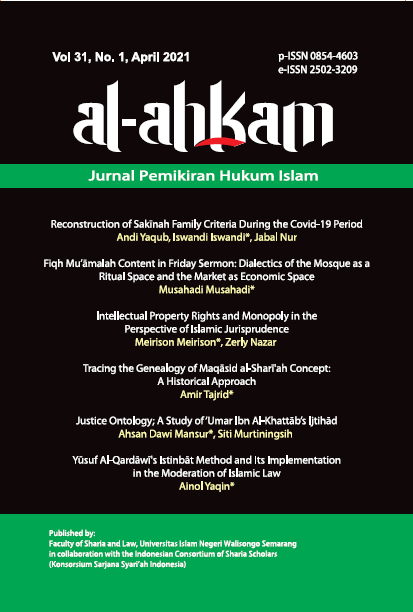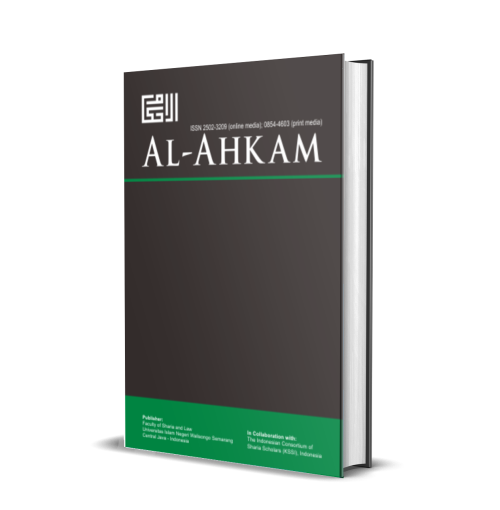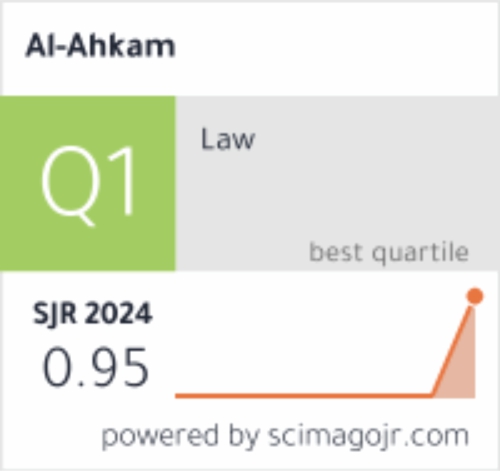Fiqh Mu’āmalah Content in Friday Sermon: Dialectics of the Mosque as a Ritual Space and the Market as Economic Space
DOI:
https://doi.org/10.21580/ahkam.2021.31.1.7383Keywords:
fiqh mu’āmalah, Friday sermon, ritual space, economic spaceAbstract
This paper describes fiqh mu’āmalah content in Friday sermons at the Great Mosque of Kauman Semarang to understand the dialectics between the mosque as a ritual space and the market as an economic space. This paper's data are in the form of 51 sermons delivered in 2015 from January 1 to December 31, 2015, and interviews with the foundation, ta’mīr, and the preachers. This paper shows that Friday sermons' characteristics at the mosque are reflected in their preachers' diversity, both in terms of educational background, scientific fields, organizational affiliations, and professions. This paper finds that fiqh mu’āmalah's content has not become the point of attention of the preachers. This finding is proven by the absence of a sermon theme on fiqh mu’āmalah (mu’āmalah madiyah). The topic that appeared in Friday's sermon was related to Islamic economics's ethical principles and business-related to mu’āmalah adabiyah. The minimal content of fiqh mu’āmalah or economic fiqh in the Friday sermon of the mosque reflects the low intensity of the mosque's dialectics as a ritual space with the market as an economic space. The Friday sermon at this mosque still does not pay more attention to the jamā’ah of Johar market seller as the essential segment.Downloads
References
AA, Multazim. ‘Status Hukum Tertib dalam Rukun Khutbah Jum’at (Telaah Kritis Fiqih Klasik)’. Al-’Adalah: Jurnal Syariah dan Hukum Islam 4, no. 1 (2019).
Aandewiel, Jurjen. ‘The Importance of Dakwah Facing the Challenges of Islam in the Netherlands’. Jakarta: The Jakarta International Islamic Conference (JAIIC), 2016.
Abdalla, Ulil Abshar. ‘Masjid dan Peradaban yang Merosot’, 2006. https://islamlib.com/politik/dunia-islam/masjid-dan-perada ban-yang-merosot/.
Al-Albānī, Naṣīr al-Dīn. Silsilah al-Aḥādīth al-Ḍa’īfah wa al-Mawdū’ah. Riyāḍ: Maktabah al-Ma’ārif li al-Nashr wa al-Tawzī’, n.d.
‘Audience Analysis as Part of a Strategic Communication Framework - IEEE Professional Communication Society’. Accessed 20 March 2016. https://procomm.ieee.org/audience -analysis-as-part-of-a-strategic-communication-framework/.
Awad, Emad S. ‘Intertextuality in Friday Khutba’. Journal of Islamic Studies and Culture 5, no. 1 (2017).
Badan Kesejahteraan Masjid. Selayang Pandang Masjid Besar Semarang. Semarang, 1988.
Bakr, Taqī al-Dīn ibn Abī. Kifāyah al-Akhyār. Surabaya: Al-Hidayah, n.d.
Depari, Catharina Dwi Astuti, and Amos Setiadi. ‘Makna Ruang Kampung Kauman Yogyakarta dan Semarang Berdasar Konsep Relasi dalam Pandangan Jawa’. Tata Loka 16, no. 3 (2014).
Devito, Josep A. Komunikasi Antarmanusia. Jakarta: Profesional Books, 1997.
Ekomadyo, Agus S. ‘Kajian Relasi Sosio-Spasial Antara Masjid dan Pasar: Kajian Atas Kontribusi Islam dalam Urbanitas Kontemporer’. In Prosiding Seminar Nasional Arsitektur Islam 2 UMS: Kontribusi Arsitektur Islam dalam Mengatasi Permasalahan Perkotaan. Surakarta: PT. Rudi Persada Nusantara, 2012.
Erman. ‘Rekonstruksi Ketentuan Shalat Jum’at’. Kutubkhanah Jurnal Penelitian Sosial Keagamaan 14, no. 1 (2011).
Gurlesin, Omer Faruk. ‘Major Socio–Political Factors That Impact on the Changing Role, Perception and Image of Imams among Dutch–Turkish Muslims’. Journal Education Science 9, no. 3 (2019).
Hashem, Mazen. ‘The Ummah in the Khutba: A Religious Sermon or a Civil Discourse?’ Muslim of Minority Affairs 30, no. 1 (2010).
Hernawan, Wawan, and Ading Kusdiana. Biografi Sunan Gunung Djati, Sang Penata Agama di Tanah Sunda. Bandung: LP2M UIN Sunan Gunung Djati, 2020.
Hosen, Nadirsyah. ‘Kesalehan Ritual dan Kesalehan Sosial’, 2016. https://islam.nu.or.id/post/read/71189/kesalehan-ritual-dan-kesalehan-sosial.
‘Kompleks Pasar Johar Semarang Kembali Terbakar’, n.d. https:// regional.kompas.com/read/2016/02/27/22072531/Kompleks.Pasar.Johar.Semarang.Kembali.Terbakar.
Lang, Jeffry. Losing My Religion: A Call For Help. Beltsville: Amana Publications, 2004.
Musahadi. ‘The Role of Mosque and Khutba in Socio-Economic Development of Indonesia: Lessons from Kauman Mosque in Central Java’. Global Journal Al Thaqafah 8, no. 2 (2018).
Rachmad, Syafe’i. Fiqih Muamalah. Bandung: Pustaka Setia, 2001.
Rahmat, Jalaluddin. Psikologi Komunikasi. Bandung: Remaja Rosda Karya, 1996.
Rahmat, Jalaluddin. Retorika Modern: Pendekatan Praktis. Bandung: Remaja Rosda Karya, 2001.
Rosyada, Dede. Hukum Islam dan Pranata Sosial. Jakarta: RajaGrafindo Persada, 1996.
Sa’īd, Ḥusam Fahid Ibn. Aḥkām Salāt al-Jumū’ah fī al-Fiqh al-Islām. Palestina: Jāmi’ah al-Najāḥ al-Waṭaniyyah, 2015.
Saddhono, Kundharu, Nugraheni Eko Wardani, Chafit Ulya, and Yusuf Muflikh Raharjo. ‘The Structure of Friday Sermon in Indonesia: A Socio Pragmatic Studies’. In Proceedings of International Prasasti III: Current Research in Linguistics. Surakarta: UNS, 2016.
Samuri, Mohd Al Adib, and Peter Hopkins. ‘Voices of Islamic Authorities: Friday Khutba in Malaysian Mosques.’ Journal Islam and Christian–Muslim Relations 28, no. 1 (2017).
Suwandi, Muhammad Hakimi Mohd Shafiai, and Wan Nasyrudin Wan Abdullah. ‘Pasar Islam (Kajian Alqur’an dan Sunnah Rasulullah SAW)’. Al-Risalah: Farum Kajian Hukum dan Sosial Kemasyarakatan 16, no. 1 (2016).
Tim Peneliti MAJT. Sejarah Penulisan Masjid Kauman Semarang dan Masjid Agung Jawa Tengah. Semarang: BP MAJT, 2007.
‘Understand Your Audience | IEEE PCS’. Accessed 20 March 2016. https://procomm.ieee.org/communication-resources-for-engineers/audience-purpose-and-context/understand-your-audience/.
White, Patricia Sloane. Corporate Islam: Modern Workplace. Cambridge: Cambridge University Press, 2017.
Yusuf, Agus Fathuddin. Melacak Banda Masjid yang Hilang. Semarang: Aneka Ilmu, 2000.
Yūsuf, Yūsuf Ibrāhīm. ‘Al-Sūq fī Ẓill al-Islām: Shakluhā wa Ḍawābiṭ Wujūdihā’. In Ḥawliyyah Kulliyyah al-Sharī’ah wa al-Dirāsāt al-Islāmiyyah. Qatar: Al-Jāmi’ah al-Qatar, 1988.
Al-Zuhaylī, Wahbah. Al-Fiqh al-Islāmī wa Adillatuh. 2nd ed. Damaskus: Dār al-Fikr al-’Arabī, 1985.
Downloads
Published
How to Cite
Issue
Section
License
By submitting an article to the journal, the author(s) agree to transfer the published article's copyright to the journal, which will act as the publisher. This means the journal will have the right to publish the article in various forms, including reprints. The journal will maintain the publishing rights to the published articles.
In line with the license, authors and third parties (readers, researchers, and others) are allowed to share and adapt the material. In addition, the material must be given appropriate credit, provided with a link to the license, and indicated if changes were made. If authors remix, transform or build upon the material, authors must distribute their contributions under the same license as the original.




